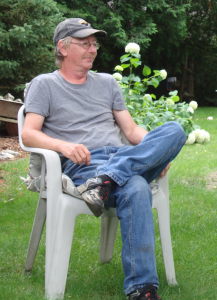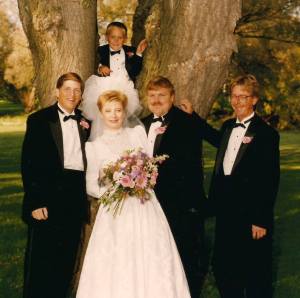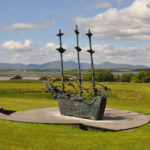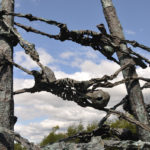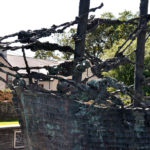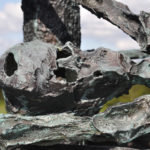Now that I have my own internet domain (blacketer.org) I should update my three (maybe four) readers on what is going on in my professional life.
I parted ways with my congregation at the end of November 2016. It was a rocky pastorate of four years, one in which we simply were not compatible. We had divergent expectations, conflicting visions, incompatible principles, irreconcilable leadership styles. A very different pastor may have done just fine there, but I could not lead that congregation, or even pursue my ministerial vocation there with any kind of peace. The result is that I do not expect to return to pastoral ministry. The experience inflicted profound and permanent damage on me personally and professionally, and not only on me, but on my family as well.
One of the issues that came up was a culture in which the gospel was identified with right-wing politics and the Republican party, and in which the pinnacle of Christian action in society was anti-abortion activism. Anti-abortion zealotry was an idol for some, even literally so, given the cast statue and the model fetuses that greeted worshippers immediately upon entering the church building. Getting the fetus shrine moved into a less conspicuous location was a battle. Preventing every infant baptism from becoming a public service announcement for Right to Life was a battle. That is a battle that has wearied me, and one that I no longer wish to fight. For me, single-issue anti-abortion activism has discredited itself; it is only pro-birth, not comprehensively pro-life.
More specifically, 2016 saw the rise not only of the candidacy of Donald Trump, but also of the extreme nationalism, the populism, the economic isolationism, and the subtle racism and bigotry of Trumpism. This I could not abide, and some members could not abide my failure to either fall in line or be silent. Some members attacked me; others who had been personal friends stopped speaking to me. Most disturbing to me was the obvious hypocrisy of supporting whomever the GOP nominated, no matter how vile, how mendacious, how destructive to the reputation of Christ’s church in the long run. I was sent a racist picture of President Obama, the sender assuming that I would find it humorous. Some members posted violent, hateful, and racist memes on Facebook, directed against President Obama and candidate Hillary Rodham Clinton. Disagree with them all you wish; direct vile hatred and slander against them? I think not.
This is just how church life is in our current environment. Nothing about this congregation is particularly unusual, especially in the quite pietistic, very Americanized, rather generically evangelical churches of this area in the southwest suburbs of Grand Rapids. There are old patterns that are almost impossible to change. My ability to tolerate it, to ignore it, to not let it bother me—that is what changed. It was eating away at my soul. Other pastors can and do handle it better than I could. I did not have the capacity to ignore the bullies, the constant complainers, those who attacked my staff (even in congregational meetings), those who sent nasty emails on a Sunday night. And the cardinal sin was for the pastor to rebuke such persons in any way. It seems to me that the pastoral role of rebuke, prescribed by Paul as an essential part of the ministry, is not allowed in many West Michigan churches. This is especially true when a congregation’s culture suggests that it is exceptional, that it does not have to follow the rules set by the denomination. In my case, the retired pastor was kept on staff, despite the warnings of the denomination not to do so, and so my ministry there was undermined from day one. Unfortunately, this is also common, and not particular to any one congregation. When the Christian Reformed Church tried to make it a rule rather than a guideline that retired pastors must leave their congregations, synod voted it down. It was a foolish decision, and one that wreaks destruction on the lives of pastors.
Another major issue for me was the treatment of women, and the view of women in church leadership, and the abject fear of even discussing the issue, even as we hired women for ministry positions, while withholding the dignity and title of “pastor.” I was rebuked for posting what was to be a several part series on the biblical and orthodox case for ordaining women as elders and pastors. I never got past the first post. I could, but will not, relate many other instances of a 1950s paternalistic attitude toward women. This is also something that I can no longer tolerate. I hope to make the time to finish this series in the future.
I very likely will never return to pastoral ministry.
I am still teaching two online courses as an adjunct professor, one at Fuller Theological Seminary, and the other at Western Theological Seminary. But I have never managed to break into teaching and academia. 2018 marks the twentieth year since I earned my PhD, and I have had exactly zero job offers, despite hundreds of applications, and a few interviews. The experience has been utterly demoralizing.
So now my main occupation is translating Calvin’s Latin for a publisher. I am grateful to have this job; perhaps I will make a career of this, if I can. I plan to continue publishing academic articles and reviews when I can manage it. But this experience has challenged my faith. I can believe in the Trinity, one God eternally existing in three personal subsistences. I can believe in the incarnation, that Jesus Christ is fully human and fully divine. But it is a huge leap of faith for me, lately, to believe that his gospel really changes people. That the Holy Spirit really indwells and animates and sanctifies the church. Or at least the church in North America. To me, it seems that the glory has departed.

